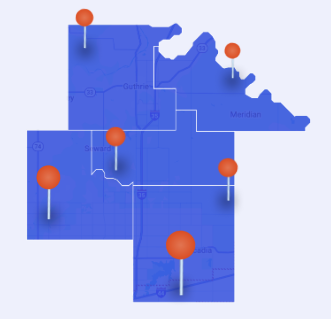Busting the Myth of the Decline of SEGs
SEGs aren’t dead—they’re evolving. Learn why they remain one of the most effective, strategic growth channels for credit unions today.


"Since the pandemic we can’t visit how we used to, it’s so hard to reach employees and make them aware of the credit union now that everyone is remote."
“The contacts say they won’t promote a single financial institution.”
“We don’t get anything from our SEGs anymore – no one responds to us, it’s been a challenge to get them to do anything with our credit union.”
Let’s clear the air: Select Employer Groups (SEGs) are not some dusty relics of the credit union world. They’re alive, kicking, and—dare I say—thriving. Yet, there’s a persistent myth floating around that SEGs are no longer relevant.
It’s time we bust that myth wide open, shall we?
Despite what many believe, the concept of SEGs isn’t outdated or restrictive—it’s one of the most dynamic and cost-effective strategies for credit union growth today. This misconception stems from outdated perspectives, often fueled by a lack of understanding of modern SEG strategies.
Let’s bust the myths surrounding the relevance of SEGs and explore why embracing these changes can be transformational for credit unions.
The Myth: SEGs are Old News
Here’s the claim: it’s hard to get engagement and growth from SEGs. They don’t align with modern credit union growth strategies. Community charters are the future, and SEGs just don’t fit the bill anymore.
Sounds convincing, right?
Many critics argue that it’s hard to drive growth from SEGs and that community charters have made SEG-focused strategies obsolete. While these arguments sound logical on the surface, they often fail to consider the adaptive nature of SEG relationships and their proven effectiveness.
Let’s not throw the baby out with the bathwater just yet.
The Truth: SEGs are Quietly Killing It
In truth, SEGs are anything but restrictive—they’re strategic.
While community charters open the door to everyone, SEGs give credit unions the opportunity to build targeted and deep-rooted relationships that drive consistent growth when all the right levers are activated through modern B2B strategies.
SEGs offer a unique opportunity to build trust-based relationships with potential eligible nonmembers for a low cost. These targeted perks create real value for an employer, which keeps their employees seeking out the credit union anytime they have a financial need or life milestone.
It’s the difference between shouting into a crowded room and having a meaningful one-on-one conversation. Spoiler alert: the latter wins.
But Aren’t SEGs Too Niche?
(Counterargument #1)
Sure, some might argue that focusing on SEGs is putting all your eggs in one basket. What if a company or group downsizes, relocates, or—heaven forbid—shuts down entirely?
Here’s the thing: a modern SEG strategy is all about diversification.
Don’t hear what I’m not saying—I strongly believe credit unions need multiple growth sources to accomplish net gains. Credit unions aren’t sticking to one SEG—they’re building partnerships with multiple employers, associations, and community organizations.
This approach spreads risk while maximizing growth opportunities. Think of it as having several baskets filled with golden eggs.
Community Charters Are Better
(Counterargument #2)
It’s tempting to think that a broad community charter is automatically better. After all, bigger is better, isn’t it?
Not always.
A wider net doesn’t guarantee more fish—it can often lead to less focus. Sole community focuses can lack the tailored approach that makes credit unions stand out.
SEGs, on the other hand, let you carve out a niche and service a well-defined audience with precision. And in today’s world, where personalization is king, that’s a big deal.
The Future of SEGs: Smart, Savvy, and Still Relevant
So, where do SEGs fit in the grand scheme of things? Right at the center of a smart growth strategy.
By combining SEG partnerships with broader marketing efforts, credit unions can enjoy the best of both worlds: the depth of SEG relationships and the reach of community charters.
I promise I’m not a hater of community-focused credit unions; I strongly believe that credit unions need to diversify their growth strategies with strategic partnerships that come with a lower cost per acquisition and couple it with broader community marketing efforts to move their institution to that next asset size, peer group, or whatever their institutional aspirations are.
I will not let this industry give up on SEGs.
I’ve seen remarkable growth come from SEGs in my time running Business Development departments. Credit unions can revitalize SEG strategies by embracing data-driven insights that matter to employers and offering exclusive benefits that create lasting value for employees throughout all aspects of their career journey that ultimately drive back to the credit union’s bottom line.
Credit unions need to reimagine partnership.
One of my favorite slogans of all time is “Think Different,” which was Apple’s slogan from 1997–2002. Credit unions need to set new standards, offerings, and expectations to partnership—and more importantly, they need to know how to sell it to an employer in a way that they understand the value and benefits.
We cannot settle for how we used to do things.
SEG strategy has evolved, and sitting in a lunchroom or doing a financial workshop isn’t going to move the needle anymore. Credit unions can strategically build strong and sustainable growth from each SEG partnership by having clear initiatives, goals, and KPIs around how these relationships are executed and managed.
Final Thought: SEGs Still Matter
The bottom line is this: SEGs aren’t going anywhere.
They’re evolving, adapting, and continuing to deliver value in ways that broader approaches can’t match. So, let’s drop the outdated mindset and start seeing SEGs for what they really are—a powerful tool for credit union growth.
It’s time to embrace this powerful strategy and unlock its full potential.
📅 Ready to discuss your credit union's SEG strategy? Book a meeting with Deliana today!
Business & Growth Strategies








.jpg)






.png)




.png)



.png)











.jpg)
.jpg)








.jpg)


